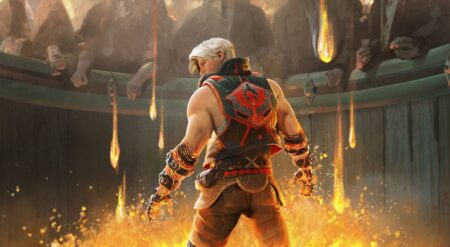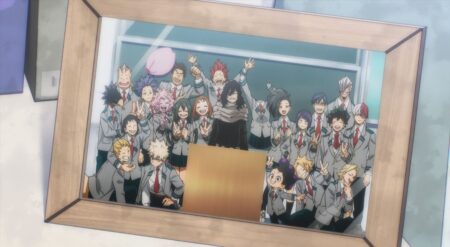
Talk to Me is one of the best films of the year. A tragedy about grief, growing up, and what it’s like to fail at letting go, the film cuts to the bone. Directed and written by Danny and Michael Philippou, this debut feature film has made a splash from Sundance to SXSW and Fantasia and everywhere in between. We got the chance to speak with the Brothers Philippou about grief, art, and creating a game as much as story in Talk to Me.
Personally, horror stories about grief have gotten me through what have been the toughest years of my life since the start of the pandemic. However, most films that tackle the subject do so in tell a story about coming to terms with, living with, or growing from grief. That doesn’t happen in Talk to Me. Instead, Danny and Michael Philippou created a film about being consumed by one of the most intense emotional processes you’ll ever go through. That choice was purposeful.
“We always knew from the start that we were going to be making a tragedy. I was writing out of a place and expressing my fears and my fears were always you know, those worst-case scenarios,” Danny Philippou says. Michael added, “[It’s a dark script] while also Mia needs to process her grief, but through the hand. She’s unable to because there’s an idea you can still connect with someone that you’ve lost. It’s in the way of being able to process grief.” Danny continues, “It was planting the seeds that if she had connected with her father instead of the hand, then things would have been different. So that’s a little bit of a message.”
The Brothers Philippou aren’t lying when they say it’s a dark script. The opening of Talk to Me is one of the starkest and bleakest cold opens I’ve seen in a film in a long time. It cuts deep, and the Philippous have made the choice for the viewers to be thrown into the deep end with no pool noodles for safety. About the scene, the directing duo gave some insight into the process and shooting.
Danny Philippou beings, “Oh, my gosh, we had to shoot that last. We had to build up to shooting that scene. So it’s the last scene that we shot in the whole movie. And we knew that we just wanted something big to pull our audience into the world of this horror and these characters, and I knew that I wanted to really show the party dwindle and get smaller and sadder throughout the film. We wanted to have the ultimate party at the beginning to open it all up. And yeah, [the brother being] behind that closed doors mirrors at the end of the film where Mia is behind the closed door. There are a lot of things subtextually going on. But yeah, it was a lot… it was a hard shot to pull off.”
Michael adds, “[The scene also] reveals something new around every corner. And there are a few subtextual things that are going on between the journey of him going in to pull his brother out of the darkness. But it was a lot of fun to shoot. We also only had 10 doors and we got it on the tenth take with the final door. Thank god.”
The WGA and SAG-AFTRA strike is still going to get fair wages and better employment protections. Want to learn more? Check out this interview.
The intensity of the film starts in the first few minutes and continues throughout, with each party growing more somber and dangerous. But while the script my call for intensity, it’s the actors who bring it to life. We asked about how the Brothers Philippou and crew kept the actors safe and helped them transition out of difficult moments. Michael answered first, “Each actor has a different way of dealing, like preparing and handling those scenes. [For us, it was just] catering to their needs and, you know, they give you what we need for that.”
“I know there’s some big like actor exercises that like when you shake things out,” Danny added. “There are those group exercises that we especially did with Joe [Bird] after he did his Riley possession. It was a thing to help really shake him out of [that space]. We try to help shake you out of the character a little bit and get out of a certain headspace.” Micheal interjects, “But Sophie is more seasoned, so she was able to do that herself. She listened to music before scenes, and then afterward, she just needs to do her thing on the side” But sometimes, helping an actor get grounded after an intense scene is just letting them have space. Danny explains, “You have to give them the room to have their breaks as well. Everyone was so collaborative and supportive, but it was like a family environment. So everyone was super nurturing. It was so much fun.”
While Talk to Me is making waves for its acting, script, and use of tension, one other element of the film stands out. In all of the visually dark shots, and there are a lot, the Brothers Philippou never lose Sophie Wilde, the lead actress who plays Mia, in it. Why is this important? Well, given that she is the only brown-skinned character in the cast, being lit at the same as her white co-stars often causes issues for film sets not being prepared or showing the care needed to keep actors from being washed out. In Talk to Me, Sophie’s beauty is clear, and it’s always captured. About that process, Danny began by thanking Aaron McCluskey, the Director of Photography on the film, explaining that “He was really able to grab that and run with it. He didn’t know he was the master.”

Michael adds, “There was never a time where we looked at it like she was underlit or anything. She always looks at you. The thing about Sophie is she’s so beautiful, that difficult part was trying to make her look [bad]… We always said, if you gave me a black eye, you’ve completely changed my appearance, but if you gave Sophie a bruise or anything it’ll make her look like you know she’s done a model photo shoot. She was just amazing.”
One final element that makes Talk to Me work is its adherence to the rules set out from the start of the game. While Mia and others break the rules around the dead man’s hand, they are always in place. Danny begins, “We had a really thick mythology bible that we really beat out, and everything’s in there. And we could always refer back to it to remind ourselves what the parameters are. But the kids are sort of messing with a homemade bomb, and they had their own rules.” If it felt like the kids were developing their own folklore versus one that is a reality in the film, that’s true. And it’s that tension between the rules at play for the kids that really pushes you to the edge of your seat.
Danny continues, “They don’t really know what it is that they’re messing with. Everyone has a different reaction.” Michael Philippou adds in the element of editing, “It’s kind of like through redrafting and really ironing out the rules and any kind of contradictions that there may have been in earlier drafts. It takes a strong Bible to know exactly where everything comes from and then implement throughout the script as well, judging if the script makes sense to those rules.”
Talk to Me has the ability to touch everyone who has lost someone. The fear of letting go and the ways in which we hold ourselves in place without moving forward is on clear display. When asked what Danny and Michael Philippou want viewers to take away from the film, the directing brothers said, “I hoped that they connected with someone in there, and I hope that there’s a rewatch ability factor as well. We planted so many seeds that will really reward a second viewing. I just really want it to be a film that people are excited to share with someone.” Michael closes out the interview, “There’s a cool moment [where folks wonder] is that the final shot? And then when it goes to the credits, they gasp of realization [for what just happened]. That’s exciting to us, you know?”
Talk to Me is in theaters nationwide now, produced and released by A24.






